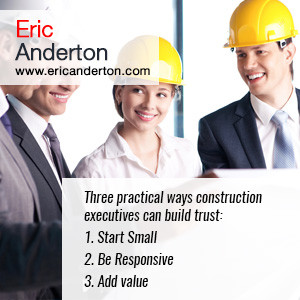This is a first in a series of blog posts over the next few months on a strategic approach to construction sales.
It wasn’t love at first site.
I’m eight years older than my wife. We first met when she was a teenager, and I was in my mid-twenties. There were no romantic sparks; I saw her as a bit of a kid, and she thought of me as an old man. But, as time passed things began to change as we got to know each other.
One of the truths of selling anything is that people purchase from people that they: “Know, Trust and Like.”
In construction, if you are going to be successful at selling work, whether to owners, developers or general contractors, people have to get to know you before they commit to working with you.
In this episode (first in an ongoing series about selling construction services) I’m going to explore each of these aspects.
- Get your face in the place
- Drop the ego
- Persist
Get your face in the place
One of my construction clients is an expert at this. He is the CEO and the “Rainmaker” for his company. He’s willing to drive, fly, and spend time getting to know potential clients. Get out of your office, hit the road, and meet your customers in person. You won’t be able to learn anything about them buy just talking on the phone. Showing up strengthens your potential project partners’ confidence in you.
Now let’s talk about your ego.
During the early days of World War II, Britain faced the Nazi menace alone.
Winston Churchill, the British Prime Minister, had a massive ego, but he was not a fool. He realized that defeat was likely without American support, and he expended a great deal of energy getting to know the US President, Franklin Delano Roosevelt. Churchill didn’t grovel but framed the situation in terms that appealed to America. He emphasized the military and economic might of the USA, and the responsibility and opportunity that came with that power. He didn’t make it all about Britain, and that helped to strengthen the relationship between the two countries.
The construction services you provide solve problems and add value to your clients. When you are getting to know them, don’t make it all about you. Drop your ego and focus on how you can benefit them.
Finally, let’s talk about persistence.
There’s a funny commercial making the rounds
It’s a TurboTax spot where a cheesy “tech-bro” approaches a young woman, pitching his new app, but really looking for a date. He gets rejected, and immediately pivots his attention to someone else. I’m all for brushing off rejection and moving to the next opportunity, but there is also something to be said for the power of persistence.
I’ve been successfully selling for over 30 years. One of the main reasons is I keep showing up. I’ll stop in and visit a contractor as I’m out and about, and six months later when I’m in the area, I’ll stop in again. I’m not necessarily looking to “sell” something that day. I want them to know that I’m around, I’m committed, and I’m available to help when they have a need.
You’re a firefighter
If you own a construction company, you probably have fires to fight on current projects and feel like you don’t have time to get known by potential new clients. Work hard teaching your people how to fight the fires, so that you can make business development a priority.
Create a list of your top 10-20 potential clients. Start showing up at their office, with a proactive (ego-free) problem-solving mindset, and a commitment to persist until you win a project.
She’s no longer a kid, and I’m a bit closer to being an old man.
At the end of last year, my wife and I celebrated our fifteenth anniversary in Kauai, snorkeling with turtles was incredible. Years ago, as we got acquainted, we began to see each other in a different light, and we married six years after we first met. We had become comfortable with the commitment of marriage as we got to know one another.
Now let’s move onto 3 Practical Ways to Build Trust
January flew by! Did you kick off the New Year with some fresh resolutions?
Hit the gym, no sweets during the week, one glass of wine (instead of 2 or 3) at the end of the day, 7 hours sleep?
Establishing healthy new routines is hard. A study in the European Journal of Social Psychology found it takes 66 days on average. Not only that but how the length of time depends on the person and ranges from 18 days to 254 days.
Just like it takes time and practice to build a new habit, so it takes time and familiarity for your potential clients and project partners to get to know you and come to trust you.
- Start Small
- Be Responsive
- Add value
Let’s kick it off by starting small.
You don’t always have to hit a home run.
Pete Rose is the all-time MLB hit leader with 4,256 hits. Over 75% of his hits were singles, and less than 4% were home runs. Even though Rose was not a home run hitter, he was extremely effective.
Construction has a unique combination of technical difficulty, compressed timelines, risk, and cost. In a non-hard bid environment, when you are trying to establish a relationship with a new client, you are not going to walk in the door and get handed a massive job to bid and hit a home run. Start small. Whatever size that means for you, be willing to budget, bid on and build a small project so that you get to know one another, and develop some familiarity and comfort.
Now, let’s consider: Be responsive
How many outstanding bid requests or client concerns do you have in your inbox?
How long have they been sitting there? Time is not friendly to most construction projects. The more time passes, no matter if you’re in the bid, plan or build phase, the bigger the challenges get. So be responsive. Implement a 24-hour rule, and respond to all emails from clients or potential clients. Don’t be one of those contractors who hide in the corner until it’s time to get paid. Be out front, proactive and available. Your clients will appreciate that they can count on you.
Finally, how can you add value?
The complexity of construction causes difficulties…,
But it also presents opportunities. When was the last time you value engineered a project and gave your client an alternative that benefited them? Savvy owners and contractors look for partners that care about all parties involved making money and being satisfied. Don’t just throw numbers at a project that you are asked to bid. Generate confidence in your capabilities, by taking the time to dive into the plans and look for creative ways to solve problems and add value.
The bad news about the trust-building stage of construction is sometimes you get burned.
The developer has been talking about a sweet project, right in your wheelhouse, for the last five years. You’ve spent hours and dollars on preconstruction services, and the deal never happens. The general contractor tells you that you’ve got a shot, but they’re just shopping your number. You have to accept this adversity as part of the game you play. Keep working hard on identifying the right clients and the right jobs.
In my last email, I challenged you to make a list of your top 10-20 potential clients.
Once you’ve got that list, evaluate it, how much trust have you’ve built with each. What small jobs can you bid? Do you have any unanswered emails from them that need attention? How can you add value to them and help them solve problems? You’ll begin to reap the reward of winning new work as you concentrate on building confidence and trust.
Side Note: I never make New Year’s resolutions;
Instead, I focus on a simple framework for self-management: Food (Moderation); Sleep (Sufficiency); Exercise (Consistency).
We’ve been exploring the idea that people buy from people that they know and trust. Let’s dive into three things you can do to be the type of person that people like.
I have a beige 2003 Honda Odyssey minivan with 206,252 miles on it.
The air conditioning doesn’t work, the fabric on the inside of the doors is ripped, the stereo’s busted, the electric windows are slow and don’t shut all the way, and there are stains of every kind, everywhere.
Most days the Odyssey sits in our driveway like an old horse put out to pasture. On weekends I take it out for a spin, ferrying kids to soccer games (I don’t care if it gets muddy), or going on Home Depot runs. I like cruising around in my “hooptie.”
- Be an equal
- Be helpful
- Be yourself
First, let’s talk about equality…
Do you remember the animated movie “Shrek”?
Eddie Murphy voiced the role of the donkey. Donkey was a bit insecure and super anxious to win the friendship of the ogre, Shrek. This picture will give you the idea:
Eventually, Donkey and the ogre grew to like each other, but it wasn’t because (if you’ll pardon the phrase) the donkey was kissing Shrek’s ass.
When you are selling work to potential or existing clients, don’t be subservient. Show up as an equal. All healthy relationships are based on mutual benefit and respect. Nobody likes a desperate salesperson.
Second, let’s look at “be helpful.”
Without Mike, I would have failed miserably
It was the summer of 1997, and I was nervous and uncomfortable. I was in charge of planning a multi-day retreat for a volunteer organization. Over fifty people were attending, the logistics were complicated, and I had a limited amount of time to prepare. I’m an expert at facilitating these types of retreats, but planning them is not my strong suit. I felt anxious and overwhelmed. As the date of the retreat rapidly approached, I was worried, overwhelmed, and stuck.
Fortunately, Mike, a fellow volunteer, had noticed my discomfort. He asked if I needed assistance. At the time, I didn’t know him that well, but I soon found out that Mike was an expert event planner. He helped me put everything together, and the retreat was a smashing success. This was the beginning of a friendship that still exists, over twenty years later. He was able to step up and help me in a time of need, and to this day I can say “I like Mike”!
Become an expert at uncovering the problems that your potential clients have in the various phases of their construction projects. If you can help, offer assistance. If they accept and you are successful, you can be confident that they will like you.
Finally, let’s consider: be yourself.
Not everyone is going to like you
I was chatting with one of my clients recently. Like many senior construction executives, he oversees the bid, plan and build portions of the business. We were discussing his approach to selling work, and he said something that struck me: “Some people like rib-eye, others just want a hamburger.”
Both rib-eye and hamburger come from cows, both fill your stomach. Rib-eye is more expensive and supposedly tastier, but not everyone thinks so. Some people prefer a good greasy burger. In my client’s case, his company is the rib-eye, and he has come to accept that not everyone likes him and the way his company approaches projects, and that’s ok.
In sales, it’s not about getting everyone to like you. Instead, understand yourself and the value you and your company provide and get busy finding people who see and appreciate that value.
Let’s get back to the list of 10-20 potential clients
How many of them like you? Perhaps you have work to do developing that bond of friendship by helping them with a problem. Make sure that you show up as an equal: “kings talk to kings.” Finally, stay true to who you and your company are. Not everyone is going to like you, and you don’t need to win every project. Just the right projects with the right people.
Last year we upgraded
My wife likes SUVs; she has never been the minivan type. Last year we finally upgraded to a fully- loaded, GMC Yukon. It’s silver, and I have to admit it’s pretty sweet, particularly for long road trips. But for rollin’ around town? I’ll stick with the hooptie.
Key Takeaway:
- Act: Make a list of 10-20 top clients or target clients
- Ask: Do they know, trust and like me and/or my company?
- Decide: What can you do in the next 30 days to build your relationship with each of your top 10-20 clients.
Construction is a long-term relationship business
Understanding that people purchase from people that they know, trust and like is a small portion of building long-term relationships.
In construction, you don’t need to learn “1001 ways to close a deal”. Instead, you need to be able to empathize, have a desire to win, welcome rejection, be optimistic, balance relationships, results and ego.





